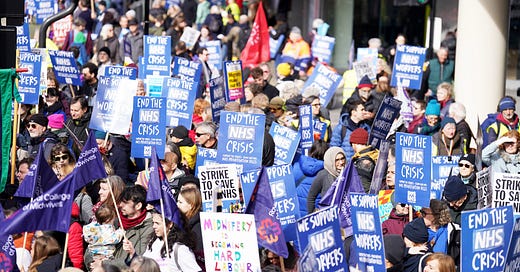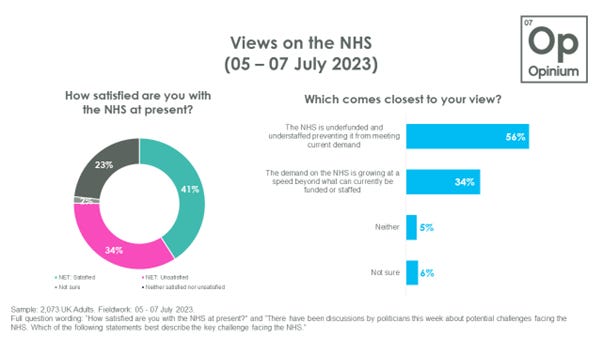The NHS always wins in British politics
Political researcher Calum Weir discusses how the public's attitudes towards the NHS trump all, and how this may shape Labour's solutions to its ongoing dilemmas.
Funding and staffing the NHS is going to be one of the most pressing challenges facing the UK government in the coming years. While it is incredibly difficult to unpack, and not always easy to accurately poll, we’ve attempted to briefly touch upon three of the issues facing the NHS - namely funding and capacity, staffing from migration, and how we should respond to industrial action. Perhaps it will not surprise any followers of British politics that the NHS wins, always wins. But what that looks like for Labour isn’t always obvious.
First off, it is worthwhile restating that a plurality are satisfied with the NHS. 41% think it is ticking along well, while a third (34%) are unsatisfied. Whatever we put this down to - satisfaction with the NHS’s care or a respect for the NHS as an institution - levels of satisfaction straddle political divides. 44% of those currently intending to vote Labour are satisfied with the NHS, as well as half (50%) of current Tory voters. Despite some commentators on the right claiming that the NHS is treated too much like a religion in the UK, Conservatives voters are as wedded to the health service as the rest of the electorate.
We tried to figure out what people thought were the key challenges facing the NHS. The choice we tested was whether people believed the NHS needed more funding to meet its current demands or if the demand placed on the NHS was so high it was exceeding the funding or staffing available. A majority (56%) think that the issue is underfunding while only a third (34%) think the issue is demand.
For Labour’s natural supporters the answer to this debate is quite clear: three quarters (77%) of 2019 Labour voters believe the NHS’s problem is underfunding and understaffing. However, only 40% of 2019 Conservatives think this, while half (49%) think the problem is the rising demand beyond what can be funded or staffed.
So if Labour wants to keep tempting 2019 Conservative voters, they might have to broaden their outlook. Labour (and notably the Shadow Health Secretary, Wes Streeting) has been cautious about over-promising on more health spending. In fact, Streeting has confirmed he would pursue a more reform-forward approach to the NHS if Labour entered power come 2024. If Labour wants to keep their base, while courting 2019 Conservatives, they will have to lead with reforms that are seen to address underfunding foremost, but also rethink how demand is being handled in the current system.
Both problems, too much NHS demand and too few NHS staff, are made even more salient in the context of the migration debate. A majority (58%) think that immigration into the UK is too high. Yet, when asked if we should have more, less or the current level of each type of work-based migrant coming into the UK, healthcare worker immigrants were in high demand. Two thirds (63%) wanted more of these migrants.
The intersection in the debate between health and migration shows just how malleable political debates are when health becomes involved. Britons generally think migration is too high but are willing to make exceptions for the NHS. Those who are older are more likely to think that we should have more healthcare workers as immigrants (65% of 65+ year olds, compared to 61% of 18-34 year olds) despite the fact that they are by far the group that most vehemently believes the UK has too much migration (79% of 65+ year olds, compared to 41% of 18-34 year olds). The NHS is like a hulking, planetary mass that warps and shifts all debates that come close to it.
Another place where the NHS gets exceptional treatment is with strikes. Healthcare workers get more support than other groups when it comes to upcoming industrial action. Indeed, they take three of the top four spots: nurses strikes have 62% support, junior doctors have 55% support and senior doctors (though behind teachers) have 41% support.
The NHS sits near some of the most heated issues of current politics: migration and industrial action. It is a testament, therefore, that the NHS has the impact of pulling the centre of gravity of those debates far away from what we assume it to be. While public satisfaction with the NHS transcends political affiliations, there are notable disparities based on party alignment regarding perceptions of its challenges. Labour is likely to face the unenviable task of addressing underfunding, while appealing to many former Conservative voters that have concerns about Labour and an open cheque book. It’s often said that Labour is the only party that can ‘get away’ with reforming the NHS, but that won’t make it easy at all.
As seen originally in Lansons-Opinium Political Capital.






